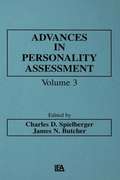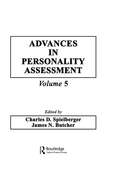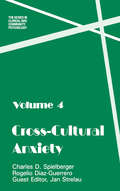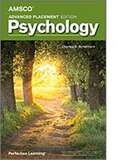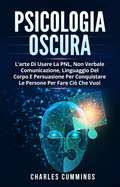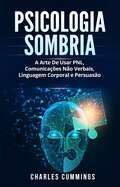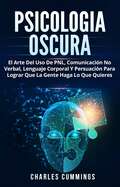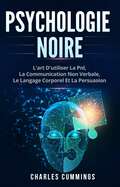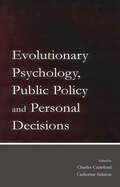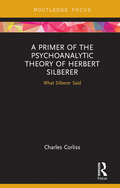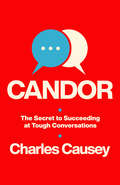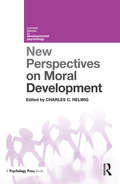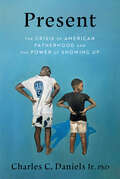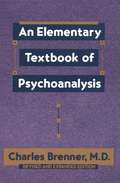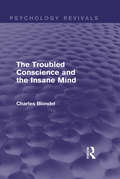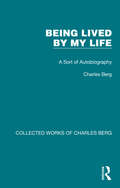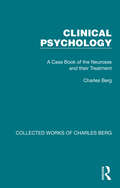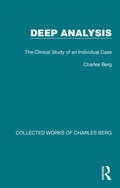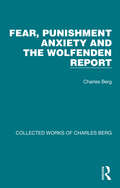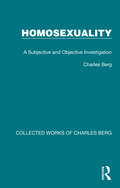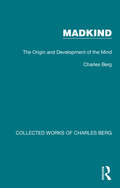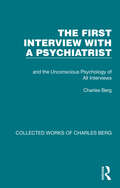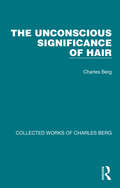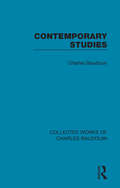- Table View
- List View
Advances in Personality Assessment: Volume 3 (Advances in Personality Assessment Series)
by Charles D. Spielberger and James N. ButcherPublished in the year 1983, Advances in Personality Assessment is a valuable contribution to the field of Psychiatry/Clinical Psychology.
Advances in Personality Assessment: Volume 5 (Advances in Personality Assessment Series)
by Charles D. Spielberger and James N. ButcherFirst published in 1985. Routledge is an imprint of Taylor & Francis, an informa company.
Cross Cultural Anxiety (Series In Clinical And Community Psychology Ser. #Vol. 4)
by Charles D. SpielbergerFirst published in 1990. Routledge is an imprint of Taylor & Francis, an informa company.
Advanced Placement Psychology
by Charles D. SchallhornIt teaches students how to think critically and scientifically about the underlying mechanisms of behavior and cover all topics for the AP Psychology course. In every chapter, important discoveries are explained, the impact on everyday life is examined, and current research is used to see each behavioral principle in action.
Psicologia Oscura: L'arte Di Usare La NLP, Non Verbale Comunicazione, Linguaggio Del Corpo E Persuasione
by Charles CummingsHai mai pensato a quanto sarebbe utile persuadere le persone per far fare loro quello che vuoi? Ti sei mai chiesto come i politici, gli amministratori delegati e i dirigenti d'azienda arrivino in cima così facilmente? Vorresti essere influente e di successo come loro, ma non sai da dove cominciare? Bene, abbiamo tutte le risposte per te e molto altro in questo libro. Con l'ebook "Psicologia oscura - L'arte di usare la PNL, la comunicazione non verbale, il linguaggio del corpo e la persuasione tper fa fare agli altri ciò che vuoi", ti insegneremo come padroneggiare l'arte della persuasione e a mettere in pratica lo strumento comunicativo della programmazione neuro linguistica (PNL). Identificando sottili spunti nel linguaggio del corpo, nell'espressione facciale, nei gesti e in altri aspetti non comunicativi, possiamo imparare come influenzare strategicamente le decisioni degli altri e a persuaderli nel modo che desideriamo. Vi forniremo consigli pratici che potrete utilizzare per conquistare le persone e farvi seguire senza che se ne rendano conto.
Psicologia Sombria: A Arte De Usar PNL, Comunicações Não Verbais, Linguagem Corporal e Persuasão
by Charles CummingsVocê já pensou em como seria útil persuadir as pessoas a fazerem o que VOCÊ desejasse que fizessem? Se isso se identifica com você, continue lendo! Em Psicologia Sombria - A Arte De Usar PNL, Comunicações Não Verbais, Linguagem Corporal e Persuasão Para Que As Pessoas Façam o Que Você Desejar Que Façam, vamos ensiná-lo a dominar a arte da persuasão e fazer exatamente isso através da ferramenta comunicativa de Programação Neurolinguística (PNL). Ao identificar pistas sutis na linguagem corporal, expressão facial, gestos e outros aspectos não comunicativos, podemos aprender como influenciar estrategicamente as decisões dos outros e persuadi-los da maneira que desejarmos. Forneceremos dicas práticas que você poderá usar para conquistar as pessoas e fazer com que elas o(a) sigam sem que percebam. Nestas páginas, você descobrirá: • As Diferenças Entre Persuasão e Manipulação • Como Identificar Manipuladores • Como Você Poderá Usar a Persuasão em Seus Ambientes Profissionais e Sociais • Identificar o Que os Indivíduos Consideram Atraente e o Que os Repele E MUITO MAIS! Com a ajuda deste livro, você poderá obter vantagem sobre os demais, seja em seu campo profissional, romântico ou social e, por fim, traduzir seu aprendizado sobre persuasão em salários mais altos, sucesso, poder, maior produtividade e, em geral, uma vida mais feliz! Se você está pronto(a) para assumir o controle e aprender o que a psicologia sombria pode fazer para melhorar sua vida, não procure mais. Não perca mais um minuto, role para cima e clique em "COMPRAR AGORA" para começar hoje! Todos nós nos encontramos em posições em que nos sentimos deficientes simplesmente porque os outros não nos ouvem. Você já pensou em como seria útil persuadir as pessoas a fazerem o que Você deseja que façam? Você já se perguntou como políticos, diretores executivos e líd
Psicología Oscura: El Arte de Usar la PNL, la Comunicación No verbal, el Lenguaje Corporal y la Persuación
by Charles Cummings¿Alguna vez has pensado en lo útil que sería persuadir a las personas para que hagan lo que TU quieras que hagan? Si esto te suena, ¡sigue leyendo! En Psicología Oscura: el arte de usar la PNL, las comunicaciones no verbales, el lenguaje corporal y la persuasión para lograr que las personas hagan lo que tu quieres, te enseñaremos cómo dominar el arte de la persuasión y hacerlo a través de la herramienta comunicativa de Neuro- Programación lingüística (PNL). Al identificar señales sutiles en el lenguaje corporal, la expresión facial, los gestos y otros aspectos comunicativos, podemos aprender cómo influir estratégicamente en las decisiones de los demás y persuadirlos de la manera que deseamos. Te proporcionaremos consejos prácticos que puedes utilizar para convencer a las personas y lograr que te sigan sin que se den cuenta. Dentro de estas páginas, descubrirás: • Las diferencias entre persuasión y manipulación. • Cómo identificar a los manipuladores. • Cómo puedes utilizar la persuasión en tu entorno profesional y social. • Identificar lo que las personas encuentran atractivo y lo que las repele. ¡Y MUCHO MÁS!
Psychologie Noire: L'art d'utiliser la PNL, la communication non verbale, le langage corporel et la persuasion
by Charles CummingsAvez-vous déjà pensé à l'utilité de persuader les gens pour qu'ils fassent ce que VOUS voulez qu'ils fassent ? Si oui, alors continuez à lire ! Dans Psychologie Noire - L'ART D’UTILISER LA PNL, LA COMMUNICATION NON-VERBALE, LE LANGUAGE CORPOREL ET LA PERSUASION POUR AMENER LES GENS A FAIRE CE QUE VOUS VOULEZ- nous vous apprendrons à maîtriser l'art de la persuasion et à y parvenir grâce à l'outil de communication qu'est la programmation neurolinguistique PNL. En identifiant les indices subtils dans le langage corporel, les expressions faciales, les gestes et autres aspects non communicatifs, nous pouvons apprendre à influencer stratégiquement les décisions des autres et à les persuader comme nous le souhaitons. Nous vous fournirons des outils pratiques que vous pourrez utiliser pour convaincre les gens et les amener à vous suivre sans même qu'ils s'en rendent compte. Dans ces pages, vous découvrirez : - Les différences entre la persuasion et la manipulation. - Comment vous pouvez utiliser la persuasion dans votre vie professionnelle et sociale. - Comment identifier ce que les gens trouvent attirant et ce qui les repousse. ET BIEN D'AUTRES CHOSES ENCORE ! Avec l'aide de ce livre, vous pouvez prendre le dessus sur les autres, que ce soit dans votre domaine professionnel, amoureux ou social, et traduire votre apprentissage de la persuasion en salaires plus élevés, en succès, en pouvoir, en productivité accrue et en une vie plus heureuse ! Si vous êtes prêt à prendre le contrôle et à apprendre ce que la psychologie noire peut faire pour améliorer votre vie - alors ne cherchez pas plus loin. Ne perdez pas une minute de plus, faites défiler la page et cliquez sur > pour commencer dès aujourd'hui ! Nous nous retrouvons tous dans des positions où nous nous sentons handicapés simplement parce que les autres ne nous écoutent pas. Avez-vous déjà pensé à combien il serait utile de persuader les g
Evolutionary Psychology, Public Policy and Personal Decisions
by Charles Crawford Catherine SalmonDuring the last 15 years, human sociobiology has metamorphosed into evolutionary psychology. It is concerned with the social problems and stresses hominid and primate ancestors encountered, the psychological mechanisms natural selection shaped to deal with these stresses, and the way those ancient mechanisms work now. Evolutionary psychologists are making great progress in expanding the understanding of human nature, however, this knowledge has had little impact on policymakers and legislators. Supreme Court justices and managers seldom consult evolutionary psychologists to help with their deliberations. When faced with private decisions few individuals ask themselves how a Darwinian perspective might help them. This volume's aim is to start the process of using theory and findings of evolutionary psychology to help make the world a better place to live. This book takes evolutionary psychology explicitly into applied areas in a way no other book has. It includes a reasonable scope of applications from pornography to psychopaths and from morality to sex differences in the workplace. An applications section provides concrete ideas for dealing with social and policy issues, including chapters on women in the workplace, rape, and child support. Providing good coverage of basic issues and theory of the field, this book gives lay people and law/policymakers appropriate background to fully understand the applications chapters. Part II provides information on basic psychological mechanisms for group living--including chapters on emotions, reciprocity and legal reasoning, and self deception--that impact on how well public policy and law function. The material in the first two sections provide an intellectual basis for the chapters in the third part of the book which deals with the application of evolutionary psychology to a variety of substantive areas related to public policy and personal decisions. A political scientist concludes the book with a commentary on evolutionary psychology and public policy. The book is designed to serve as a stand-alone text in evolutionary psychology and public policy that can be used in a variety of disciplines, such as psychology, social work, law and psychology, and public policy.
A Primer of the Psychoanalytic Theory of Herbert Silberer: What Silberer Said (Routledge Focus on Analytical Psychology)
by Charles CorlissHerbert Silberer was an early member of Freud’s Vienna Group whose work was unique and prodigious; yet, owing to his expulsion from the psychoanalytic community, his contributions have been dismissed for close to a century. Based on original documents and primary sources, A Primer of the Psychoanalytic Theory of Herbert Silberer: What Silberer Said recovers the psychoanalytic theory of Herbert Silberer, revealing its connections to philosophy, theology and transcendence, and examining how his writings influenced C. G. Jung. The book begins with an overview of what is known of Silberer’s life, before commencing with an exploration of his writings. Charles Corliss covers topics including Silberer’s groundbreaking construct of the hypnagogic phenomenon, the process and meaning of symbolism and symbol formation, alchemy and its connection to his major work Problems of Mysticism and Symbolism, the use of symbols in Freemasonry and his influential understanding of dreams and their meaning. The book also explores Silberer’s complex relationship with the field of psychoanalysis, including his opposition to many psychoanalytic assumptions. Introducing and assessing the main contributions of Silberer’s work, this book will be of interest to analytical psychologists and Jungian psychotherapists in practice and training, as well as to academics and students of Jungian studies and the history of psychoanalysis, psychoanalytic studies, theology, philosophy and the history of psychology.
Candor: The Secret to Succeeding at Tough Conversations
by Charles CauseyOvercome the fear of speaking truth by learning to do it with love.In a society where sensitivities take precedence over honesty, it can often feel impossible to openly speak your mind. From managing conflict resolution in the workplace to navigating differences at home, many issues remain unaddressed and unresolved when you cannot speak clearly, candidly, and truthfully for fear of negative consequences.It&’s time to learn how to speak the truth in love. In Candor, you&’ll learn how truth and love together can unlock pathways to more effective leadership and relationships—even in a day and age when many remain silent for fear of speaking up. Discover how speaking with sensitive and effective candor can reshape your relationships and enable you to live a life of honesty and freedom.
Candor: The Secret to Succeeding at Tough Conversations
by Charles CauseyOvercome the fear of speaking truth by learning to do it with love.In a society where sensitivities take precedence over honesty, it can often feel impossible to openly speak your mind. From managing conflict resolution in the workplace to navigating differences at home, many issues remain unaddressed and unresolved when you cannot speak clearly, candidly, and truthfully for fear of negative consequences.It&’s time to learn how to speak the truth in love. In Candor, you&’ll learn how truth and love together can unlock pathways to more effective leadership and relationships—even in a day and age when many remain silent for fear of speaking up. Discover how speaking with sensitive and effective candor can reshape your relationships and enable you to live a life of honesty and freedom.
New Perspectives on Moral Development (Current Issues in Developmental Psychology)
by Charles C. HelwigThis volume presents a selection of some of the most exciting new perspectives on moral development that have emerged over the last decade and have transformed our understanding of the field. The contributors to this book cut across traditional boundaries to provide an innovative and integrative approach to fundamental questions dealing with the nature and acquisition of morality. In addressing these questions, the chapters draw on new work on the origins of morality in infancy and the early years, comparative approaches examining morality in primates, new perspectives on moral emotions such as guilt and empathy, and new perspectives on the emerging moral self in childhood and moral identity in adolescence. The book also examines the roles of parenting and culture in children’s and adolescents’ moral development. Each chapter is framed in theory and methodology and provides illustrative examples of new research to address important questions in the field. This book is essential reading for researchers and advanced undergraduate and postgraduate students studying moral development and developmental psychology. It will also be of interest to academics and professionals in related fields such as education and public policy.
Present: The Crisis of American Fatherhood and the Power of Showing Up
by Charles C. Daniels Jr., Ph.D.An essential deep dive into absentee fatherhood, the obstacles and stigmas that exasperate it, the dads who want to reconnect with their children, and what it takes for families to start healing—from the co-founder of Fathers&’ UpLift&“Dr. Daniels, one of the nation&’s foremost experts on fatherhood and healthy families, has written a book that will help all of us show up for the fathers in our lives.&”—Michael WearYoung men of color want to be good dads, but it takes more than a strong will to make that desire a reality. Charles C. Daniels Jr., PhD, a therapist and the co-founder and CEO of Fathers&’ UpLift, an organization that helps fathers reconnect with their kids, learned firsthand while serving primarily Black and Brown men that it&’s possible for fathers to overcome the significant challenges to establishing a relationship with their kids after weeks, months, or even years of separation.Present is an honest look at the complexities that accompany separation and the sometimes grueling effort it takes to overcome those barriers. Drawing on therapeutic practice and the experiences of thousands, Daniels describes what it takes for fathers to parent themselves, for families to practice forgiveness, and for fathers and communities to create support structures so that dads can navigate life transitions, relate better to the whole family, and heal from their own woundedness.Daniels details systemic obstacles that disadvantage fathers and societal stigmas that make healing relationships with children challenging. But he shows that they aren&’t the end of the story—it&’s still possible to reestablish familial bonds. For young men and those who support them, and for those who are interested in the struggles these men and their children face, Present is a book of challenge and of hope, filled with stories from Daniels&’s own life and the lives of the fathers he serves.
The Troubled Conscience and the Insane Mind (Psychology Revivals)
by Charles BlondelOriginally published in 1928 in the Psyche Miniatures Medical Series, this title was an attempt to bring to the attention of British psychologists and psychiatrists some aspects of the work and thought of French psychologist Charles Blondel. Well known abroad but little known in England at the time, he was professor of Psychology at the University of Strasbourg and founder of a school of ‘morbid psychology’. This book contains two papers, the first concerning the theory of the disordered mind and the second deals with the relation between disordered thought and speech. Today it can be read and enjoyed in its historical context.
Being Lived by My Life: A Sort of Autobiography (Collected Works of Charles Berg)
by Charles BergOriginally published in 1957, this book was a new departure in autobiographies. It is both enlightening and entertaining. There is a happy blending of narrative, reflection and occasional extracts from case histories which gives it a delightfully human character. But it is more than this. It is a story of the profound inward adventure of an exceptionally inquiring mind. From childhood to professional maturity it proceeds through economic difficulties, love and tribulation to science and general medical practice. It tells how Dr Berg became so convinced of the psychogenesis of human suffering that, with great courage, he gave up his practice and personal security to search for the causes in mental conflict. The story proceeds through specialisation in psychiatry to analytical training and analytic practice, building up in the later chapters to a description of the troubled mind in all its manifestations, and of the medical analyst’s daily work. There is a new explanation of the psychology of love with the inclusion of personal as well as professional experiences. Here, as throughout, conclusions have an astonishing difference from orthodox or familiar speculation, and this is because they are based strictly on knowledge, professional and personal. The style is natural, lively and lucid. Here is an opportunity to combine learning with entertainment for Dr Berg has an extraordinary flair for presenting difficult things attractively, without sacrifice of scientific essentials. This book is a re-issue originally published in 1957. The language used is a reflection of its era and no offence is meant by the Publishers to any reader by this re-publication.
Clinical Psychology: A Case Book of the Neuroses and their Treatment (Collected Works of Charles Berg)
by Charles BergOriginally published in 1948 the blurb read: 'Dr Berg has an extraordinary flair for presenting a difficult subject in a most realistic and attractive manner, without sacrifice of scientific essentials. The patients are made to speak for themselves, with the result that we feel actually present at the analytical sessions, sharing the most intimate details of each individual’s life and feelings. Throughout it is alive with real, vivid clinical material. The reader is led through a panorama of troubled minds and disturbed emotions – from the simplest worries and anxieties, through increasing severity of stresses, to incipient major disorders. The whole subject of treatment is reviewed and expounded in compendious detail, concluding with a critical review and revolutionary suggestions for the future. In spite of its novel and entertaining method of exposition, the book covers a surprisingly wide field – the whole field of clinical psychology up to date – and more.' Today it can be read and enjoyed in its historical context. This book is a re-issue originally published in 1948. The language used is a reflection of its era and no offence is meant by the Publishers to any reader by this re-publication.
Deep Analysis: The Clinical Study of an Individual Case (Collected Works of Charles Berg)
by Charles BergFirst published in 1947, with a second edition in 1950, the original blurb reads: 'This is an illuminating description of a complete Freudian analysis of a single case. From the first interview to the last the reader’s attention is engrossed with the almost-normal personality of the individual who is being analysed. We see his thoughts, philosophy, and emotions gradually unfolding under the application of analytical technique (lightly explained in the second chapter), until – and this is where the book is such a tremendous advance upon the psychological novel – the very springs and mechanisms of his psychic pattern and emotional structure are abundantly and lucidly revealed. We see and understand the hidden depths of the nature of the human mind, and obtain introductory insight not only into normal mental functioning, but into almost all its psychopathic aberrations including frigidity, impotence, love, hate, hysteria, obsessions, and even paranoia and schizophrenia – all in minor degrees an integral part of normality. In spite of this the book is light reading and, though particularly instructive to doctor and professional psychologist, understandable to the average intelligent layman.' This book is a re-issue originally published in 1950. The language used is a reflection of its era and no offence is meant by the Publishers to any reader by this re-publication.
Fear, Punishment Anxiety and the Wolfenden Report (Collected Works of Charles Berg)
by Charles BergOriginally published in 1959, the blurb read: ‘Dr Berg has made a comprehensive survey of the Wolfenden Report in regard to homosexuality and illustrated his comments with extracts from case material. He points out that whereas public opinion has so far lagged behind the Committee’s main recommendation, scientifically far from being an advance the report may be considered lamentably reactionary. He says; "Perhaps this report is a good lesson in the futility of trying to unravel and assess psychological phenomena without first removing the obstacles to understanding their meaning". The author deals with the subject in his usual forthright, witty and persuasive style, which is easily enjoyed by psychiatrist and layman alike, and the book should be welcomed by all who seek to understand this controversial topic. Later chapters include a discussion of the wider implications of punishment and a new theory of the fundamental nature of Anxiety and Fear.’ Today it can be read and enjoyed in its historical context. This book is a re-issue originally published in 1959. The language used is a reflection of its era and no offence is meant by the Publishers to any reader by this re-publication.
Homosexuality: A Subjective and Objective Investigation (Collected Works of Charles Berg)
by Charles BergFirst published in Britain in 1958, the original blurb read: ‘To those whose sex life is based on heterosexual relationships, the homosexual is a grotesque, shadowy creature – a person spoken of with scorn. If you are not one of us, it is impossible to realise our feelings when this occurs. It is incredible to us that a well-educated girl could make the following remark: "What do they look like? I wonder if I’ve ever seen one?"’ These words – written by a lesbian and taken from one of the personal histories of homosexual men and women which open this book – might be taken as its theme. In our statistically minded age, we are apt to forget that behind the word homosexual there is always a person. Widespread misconceptions about homosexuality are particularly startling when one considers the disturbing prevalence. The purpose of this book is to bring into public light, the knowledge of the manifestations of the problem, so that they may be openly examined. The book is divided into two parts: Part One presents a collection of revealing autobiographies, diaries, letters and intimate observations in which the homosexuals speak for themselves. Part Two offers an examination of the cause and cure of homosexuality by important figures from all major schools of thought. It includes contributions by Sigmund Freud, C. G. Jung, George W. Henry, Magnus Hirschfield, Wilhelm Stekel and Sandor Ferenczi. In editing this volume, Dr Berg has bridged a significant gap in the scientific approach to sexual behaviour. By bringing to life the feelings, fears, attitudes and anxieties of the human being behind the statistics of homosexual incidence, as well as the causes, it should become indispensable to the movement for intelligent sex education. This book is a re-issue originally published in 1958. The language used is a reflection of its era and no offence is meant by the Publishers to any reader by this re-publication.
Madkind: The Origin and Development of the Mind (Collected Works of Charles Berg)
by Charles BergFirst published in 1962, the original blurb reads: ‘This provocative book explores the whole range of human thought conduct and beliefs. Commencing with primitive man and his superstitions it goes on to study our present-day cultural institutions, customs, ritual and other behaviour upon which we pride ourselves. All of these are shown to have identical primitive mechanisms and to be subjectively determined without reference to scientific knowledge. These delusions are shown to be mostly undesirable and harmful and the author goes on to state that only objective thinking, scientifically based, can lead to any ultimate good. The later chapters contain an aetiological study of the mind. The author states "If we can consider the human mind in the light of its origin and development we may better appreciate its basic nature and its inevitable limitations". The subject matter is amply illustrated with clinical examples in Dr Berg’s usual lively style. This book is one which will affect all readers. None of us is immune from delusions, however much we may delude ourselves to the contrary, and the presentation of these truths will to some of us seem shocking in the extreme.’ Today it can be read and enjoyed in its historical context.
The First Interview with a Psychiatrist: and the Unconscious Psychology of All Interviews (Collected Works of Charles Berg)
by Charles BergOriginally published in 1955, the blurb read: 'Again in this book the author expounds his main thesis – perhaps the main thesis of all modern psychiatry – namely that our conscious pre-occupations, thoughts and behaviour are merely the products or "symptoms" of a process that is going on within us (basically a physiological process) of which we are totally unconscious. Although we are at pains to conceal from ourselves and others, and even vehemently to deny, the nature and the very existence of this fundamental unconscious process, it is nevertheless the determinant of all that is us, biologically, psychologically and sociologically. In the author’s own words: "It is the force behind all activity, all life. It exists unseen in the most apparently superficial human relationship, even in the interview – as this book will show. It alone can give us the meaning of what we do and feel." The theoretical section of the book deals with the interviewer and the unconscious forces which determine the effects and the therapeutic results of the interview. The longer practical section demonstrates, by abundant examples from clinical material and by complete documentaries of actual psychiatric interviews, that it is unconscious forces which determine the patient’s symptomatic picture, his behaviour, his attitude to life, and above all his emotional relationship to the psychiatrist – and indeed to everyone he meets in every personal contact. The elucidation of this process should be of the utmost interest and of the utmost practical value to each of us in our every contact, superficial or deep, with every human being whom we meet in the course of our lives. The book will appeal to a wide public. Although it demonstrates the deepest and most worthwhile aspect of modern psychology and psychiatry, it avoids technical jargon and is written in a cheerful, lively and lucid style, easily assimilable by everybody.' Today it can be read and enjoyed in its historical context. This book is a re-issue originally published in 1955. The language used is a reflection of its era and no offence is meant by the Publishers to any reader by this re-publication.
The Unconscious Significance of Hair: A Sort Of Autobiography (Collected Works of Charles Berg)
by Charles BergOriginally published in 1951, the implications of this book were thought to be far wider and deeper than its title suggests. 'Hair-activities are chosen merely as a sample of uncritically accepted human behaviour. The author then proceeds to examine them very carefully in the light of dreams, anthropology, folklore, symptoms and perversions. He shows them to be an expression of instinct-driven tensions and conflicts. The popular illusion that they are determined by reason or adaption to reality is exploded. The corollary is inescapable; if in this innocent particular our thoughts and behaviour are symptomatic expressions of an unconscious conflict or complex, how much more psychopathic would our more significant ideas, beliefs, institutions, customs and laws prove to be on similar detailed investigation! Is, therefore, our self-expression in life and civilization nothing more than a symptom, identical in its source and mechanism with the symptoms of nervous and mental illness? The book is really a psychiatric criticism of normality based upon a chosen item of typically normal behaviour. It is, however, written in a way that will be easily understood by every intelligent reader.' This book is a re-issue originally published in 1951. The language used is a reflection of its era and no offence is meant by the Publishers to any reader by this re-publication.
Contemporary Studies (Collected Works of Charles Baudouin)
by Charles BaudouinOriginally published in 1924, this title is divided into four parts, each looking at contemporary issues. Beginning with ‘The Liberators of the Mind’, the author discusses important thinkers of the time, such as Tolstoy and Nietzsche. The second part looks at ‘The War and the Peace’, which refers to the recently fought First World War. He then moves on to ‘Education and Society’, where discussions include Bahaism and Father Christmas. The final part looks at ‘Art and Criticism’, discussing the trends of French post-war poetry – realism, symbolism and dynamism – followed by a look at dynamic drawing. This volume is available again after many years out of print.
